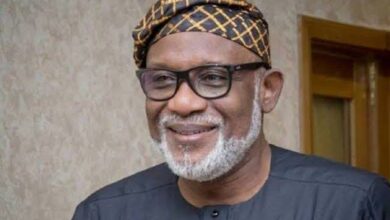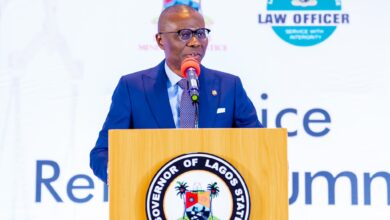
A Nigerian professor, Uche Chigozie has been re-arraigned by the Economic and Financial Crimes Commission (EFCC) before a Federal High Court in Lagos for allegedly defrauding the Maize Growers, Processors, and Marketers Association of Nigeria of N1.47bn through money laundering.
Chigozie and three companies, Visionary Integrated Consulting Ltd, Nemad Associates Ltd, and Revamp Global Enterprises, are facing eleven counts of conspiracy, fraud, stealing, and money laundering.
The case was reassigned to the new trial judge, Justice Dehinde Dipeolu, after the previous judge, Justice Nicholas Oweibo, was transferred out of the Lagos Division.
According to the prosecution counsel for EFCC, Chinenye Okezie, the defendant allegedly conspired with the other defendants and used N1.47bn belonging to the Maize Growers, Processors and Marketers Association of Nigeria.
The defendant allegedly retained the sum of N197m in his UBA account, which was a part of the proceeds of illegal acts of gratification.
He also used N120m to acquire a property in the Gwarimpa area of Abuja and another N200m to acquire two properties in Owerri, Imo State.
The defendant allegedly used the aggregate sum of N90m to acquire several plots of land in parts of Owerri and N34m to acquire three Toyota Hilux vehicles in his name.
Read Also: FG Arraigns Former US-Marine, Donn Perkins Over Alleged Unlawful Importation of Firearms
The commission also claims that the defendant received a dollar cash payment equivalent to N87m from one Muwawiyya Haruna, which exceeded the amount authorized by law.
The EFCC stated that the defendant ought to have known that the money formed part of the proceeds of unlawful activity of fraud.
The defendant had pleaded not guilty to the charges against him. After his plea, the defence counsel, Mr Etudo Mefo, urged the court to allow the defendant to continue on an earlier bail granted to him by the court on August 7, 2023.
The prosecutor, Mrs Chinenye Okezie, urged the court only to allow the defendant to continue on his existing bail if the defence counsel would undertake to ensure his attendance in court.
She explained to the court that the defendant had been absent on certain occasions, which she claimed had caused some drama.
The prosecutor, therefore, insisted that she would not oppose the bail continuation if the defence counsel made that undertaking.
In response, the defence counsel told the court that when the defendant was first granted bail, his sureties included his biological father and a legal practitioner.
He was willing to add to the number and thus undertook to ensure the attendance of the defendant in court.
Justice Dipeolu adjourned the case until March 13 for trial.






